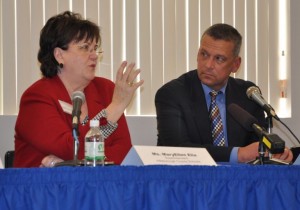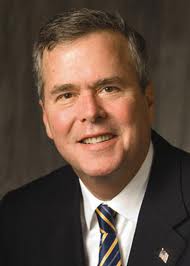Indiana: Republican lawmakers scale back a proposal to eliminate a requirement that students attend public schools for one year before becoming eligible for a private school voucher (Associated Press). They pass it mostly along party lines in the House (Associated Press). They're advancing a proposal to switch administration of the voucher program away from newly elected Superintendent Glenda Ritz (Associated Press). They're also considering a Democratic proposal to give school districts with more than 50 percent of their students in charter schools the ability to approve new charters (Post Tribune).
 New Hampshire: The state House votes to repeal the tax credit scholarship program passed into law last year over Gov. John Lynch's vote (New Hampshire Public Radio).
New Hampshire: The state House votes to repeal the tax credit scholarship program passed into law last year over Gov. John Lynch's vote (New Hampshire Public Radio).
Iowa: The state's Catholic bishops push for vouchers (Iowa Radio).
Texas: Senate Education Committee Chairman Dan Patrick, R-Houston, files legislation to lift the cap on charter schools and create a new body to authorize them (Texas Tribune). More from the Austin American Statesman and the News-Journal. Patrick's proposal for tax credit scholarships isn't getting a warm reception from fellow lawmakers (San Antonio Express News). Thousands of people turn out for a Save Our Schools rally to restore education funding, reduce standardized testing and oppose vouchers and charter schools (KVUE.com)
Alaska: A debate over a proposed constitutional amendment that could open the door to private school vouchers is heating up (Anchorage Daily News). The chair of the Senate Education Committee says his committee will still hold hearings on vouchers even though it will no longer be considering a bill on the proposed amendment (Alaska Public Radio News).
California: The race for three seats on the L0s Angeles Unified School Board has drawn national interest - and financial support - due to three candidates who favor parental choice, charter growth and data-based teacher evaluations (Los Angeles Daily News).
Idaho: Lawmakers propose measures to allot charter schools $1.4 million in facilities funding and allow colleges, universities and nonprofit groups to authorize charter schools (Idaho State Journal). More from Idaho Education News.
Georgia: Amid the debate on parent trigger laws and charter schools, one education advocate ponders: Whose responsibility is it to educate a child — society’s or the parent’s? (Atlanta Journal Constitution). The Georgia Legislature considers an expansion of the tax-credit scholarship program (Rome News Tribune). (more…)
Florida’s new education commissioner is known for his zealous support of charter schools and vouchers and other learning options that some critics see as anti-public school.

Florida Education Commissioner Tony Bennett and Hillsborough Superintendent MaryEllen Elia were among the panelists at a National School Choice Week event in Tampa. (Photo by Lisa A. Davis/Step Up For Students)
But on Tuesday afternoon, Tony Bennett sat next to Hillsborough County Public Schools Superintendent MaryEllen Elia inside a Tampa magnet school for boys, and praised the growth of choice in district schools across the state.
Florida is transcending the first round of conversations on choice that pit private and charter schools against public schools and virtual schools against “brick and mortar’’ ones, Bennett said during an event marking National School Choice Week. The new conversation, he suggested, isn’t either-or; it’s whatever works to ensure all kids have access to quality choices.
“So we’re now talking about choice – not just private schools and charter schools and virtual schools – we’re talking about public school choice,” he told an audience of about 100 people gathered at the Boys Preparatory Academy. “We’re talking about creative leaders like MaryEllen, like the team here, creating educational opportunities for children within the district - and really going to what we all heard was the purpose of choice to begin with, to provide incubation for innovation for our public schools.”
Tuesday’s event was sponsored by the Florida Alliance for Choices in Education, a coalition that includes a wide swath of school choice groups. Bennett and Elia sat on a panel with representatives from home-schooling, virtual education, magnet schools, career academies, Florida tax credit scholarships and McKay scholarships.
Most were parents who had lived and breathed school choice, starting with their own children. As they shared stories of searching for schools that practiced their faith or fit their child’s academic needs, they offered numbers that shed light on the choice movement’s impact. (more…)
California: The award-winning American Indian Model charter schools face closure after failing to fix problems with financial oversight that resulted in $3.8 million of questionable expenses (The Oakland Tribune).
Wisconsin: Three former state House speakers push for a voucher expansion (Associated Press). School choice options continue to grow with proponents pointing to achievement gains (WisconsinReporter).
Indiana: Ball State University pulls its sponsorship of seven struggling charter schools, likely ensuring their closure (Associated Press). School choice supporters press for an expansion of the state's voucher program (NWI.com).
Texas: A school choice proponent testifies that a tax credit scholarship program would save the state $2 billion a year (Houston Chronicle). More from San Antonio Express News. Waco-area school boards support a resolution opposing any publicly funded private school choice options for the state (Waco Tribune Herald).
Michigan: The legislative path for Gov. Rick Snyder's school choice expansion plans remain murky (MLive.com).
Tennessee: A school board member in Knox County tries unsuccessfully to convince his colleagues that private school vouchers are a good thing (Knoxnews.com). State lawmakers scrutinize Tennessee Virtual Academy, operated by K12 Inc., over poor test results (Tennessee Public Radio). Memphis charter schools are poised to grow - again (Memphis Business Journal). The NAACP pushes for more regulatory accountability for charter schools in the wake of complaints about one in Memphis (Memphis Commercial Appeal). Gov. Bill Haslam is expected to unveil his proposal for a limited statewide voucher in his State of the State speech tonight (News Channel 5).
New York: Twenty-four more Catholic schools in the state will close because they're not financially self-sufficient (New York Times). (more…)
To appreciate the significance of what Nikolai Vitti is saying about parental choice, one must first read his resume. He’s a 36-year-old with a Harvard education doctorate who served as chief academic officer to nationally recognized Miami-Dade school superintendent Alberto Carvalho before being chosen in the fall to run the Duval County school district, the 22nd largest in the nation.
So Vitti is, by anyone’s definition, a comer on the national public education scene.
And he says this: “I support choice because I think parents need options, especially those that do not have the financial means to go to a private school.”
And this: “I just don’t believe that anyone should tell a parent where they should send their child to school. I’m vehemently opposed to limiting options, especially to parents whose children are in lower performing schools or parents who don’t have the financial means to have the same flexibility that a parent would have of means. And that’s historically what’s happened with our public education system.”
These statements, in an enlightening podcast posted to this blog on Monday, are all the more impressive given that the school district he now commands has an uneasy history with private school choice. The pressure on him to continue to wage high-profile war is certainly great. But Vitti comes from a place, and perhaps a generation, where choice is not a dirty word. He openly praises charter operators such as KIPP, even borrowing from some of their practices while in Miami, and asserts that competition is making school districts up their game. In one of his first meetings on the new job, he recommended, and the school board approved, 12 new charter schools.
Vitti, then, is owed more than a pat on the back. He is also trying to break through the political divide to encourage open-minded debate on how to make choice actually work. Toward that end, he brings legitimate concerns to the table and needs to be heard. (more…)
When people hear the term “school choice,” they usually don't think about it in a traditional public school setting, said Joy Frank, general counsel for the Florida Association of District School Superintendents. But public school districts offer students a growing array of choice programs, too, from online classes to career academies to International Baccalaureate programs.
“We have embraced choice,” Frank told members of the Florida House Choice & Innovation Subcommittee during its first meeting this week.
Frank’s comments are another sign of evolving perceptions regarding parental school choice. She and others who are grounded in the traditional public school camp may not embrace publicly funded private options such as vouchers and tax credit scholarships. But it wasn’t long ago that even public options such as IB and magnet schools were considered controversial. Implicit in her remarks is an acknowledgement that giving parents more choice for their children is a worthy goal.
Frank went on to tout public school choice programs across the state, including Polk County’s Central Florida Aerospace Academy, which has a high school at the Lakeland Regional Airport. She also lauded the phenomenal growth of school choice in Miami-Dade County, which opened its first magnet school in 1973 and now offers some 340 choice programs serving 43,000 students. (Coincidentally or not, the Miami-Dade school district also has among the highest rates of students enrolled in charter schools and private schools via tax credit scholarships.)
Traditional school leaders in Florida are increasingly making similar statements. (more…)
 Jeb Bush on FCAT, Common Core, bipartisanship. He tells StateImpact Florida, “Education is one of the few places where you have left-right coalitions that are for reform and left-right coalitions that are against reform. It’s not as monolithic as other areas of policy.”
Jeb Bush on FCAT, Common Core, bipartisanship. He tells StateImpact Florida, “Education is one of the few places where you have left-right coalitions that are for reform and left-right coalitions that are against reform. It’s not as monolithic as other areas of policy.”
Orange school board considers more school choice. It’s considering a policy that would allow students at over-capacity schools to enroll at under-capacity schools, reports the Orlando Sentinel.
More on charter school funding. Orlando Sentinel.
Charter school teacher raises. Represented by the Broward Teachers Union, the charter school teachers in the Pembroke Pines system win a raise through arbitration, reports the South Florida Sun-Sentinel.
Proposed cut scores. For biology and geometry end of course exams and FCAT science. From Gradebook. From Sentinel.
FEA talks teacher evaluations today. From the News Service of Florida: Members of the Florida Education Association discuss impacts of the new teacher evaluation system that was created as a result of SB 736 setting up merit pay. FEA President Andy Ford and teachers participate.
A new Florida House subcommittee devoted to all things school choice does not necessarily signal major reforms in the upcoming legislative session, says incoming House Speaker Will Weatherford. The point, rather, is to keep choice in the debate.
“I think choice has always been in the conversation,’’ Weatherford, who is scheduled to be voted in as speaker today, told redefinED.
Creating the Choice & Innovation Subcommittee is really more about helping the Education Committee make sure parental empowerment, technology and other school choice issues don’t get lost in the general discussion, he said. Education is “such a huge policy area,’’ Weatherford said. “There are a lot of bills that get filed.’’
Expect those bills to include many that have more to do with overall education policies and red tape than turning classrooms into a “21st learning experience,’’ he said. “There’s a lot of reform and a lot of innovating taking place across the country and across the world,’’ Weatherford said. “I want the Legislature to lead this debate.’’
The subcommittee has sparked interest across party lines. (more…)
If the chatter among Florida charter school supporters is any indication, expect to see proposed legislation next spring that calls for equitable funding for charter schools and the return of charter authorizers who are independent from public school districts.
“This is a forced marriage that needs counseling,’’ joked Ralph Arza, a former Florida legislator who now serves as the governmental affairs director for the Florida Consortium on Public Charter Schools.
More than 100 charter school operators and advocates, who met Wednesday during the 16th Annual Florida Charter School Conference in Orlando, also want more streamlined applications and sanctions against districts that drag out the appeals process.
The way it works now, some applications call for thousands of pages of documentation, said Collette Papa of Academica, a charter school management company with about 100 schools in Florida. If a district denies the application, the appeals process can take anywhere from three to six months, Papa said. If the charter school wins approval, often it’s too late to hire teachers, secure a site and recruit students in time to open the same year, she said.
Papa was part of a 7-member panel that included Mike Kooi from the Florida Department of Education’s Office of Independent Education and Parental Choice, Pamela Owens of Charter Schools of Boynton Beach, Marvin Pitts of Mavericks in Education in south Florida, Gene Waddell of Indian River Charter High School in Vero Beach and Tim Kitts, who operates five Bay Haven Charter Academy schools in Panama City.
The panel discussion anchored a town hall meeting that kicked off the two-day conference. It was sponsored by the consortium and led by Arza, who served in the Legislature between 2000 and 2006 and helped pass education laws including former Gov. Jeb Bush’s A++ plan.
Since that time, Arza said, the state has slowly chipped away at the heart of school choice reforms. (more…)
 In our Florida roundups this week, we neglected to mention a significant and promising development – the election of a pro-school-choice candidate to the board that oversees one of the biggest school districts in Florida and the 22nd-largest in the country.
In our Florida roundups this week, we neglected to mention a significant and promising development – the election of a pro-school-choice candidate to the board that oversees one of the biggest school districts in Florida and the 22nd-largest in the country.
Jason Fischer, 29, easily won a seat on the Duval County School Board with a platform that included strong support for charter schools and private-school vouchers. His victory is all the more significant because he faced a strong, well-funded challenger in a 125,000-student district that has been more resistant than most to expanded school choice.
“I used the word vouchers. I used the word charter schools. I didn’t shy away from it,” Fischer told redefinED today. “I was bold about who I was and what I wanted to do.”
That message resonated in his conservative district, and Fischer has an opportunity to build on it and reach folks of all political persuasions. As a school choice advocate on a big-city school board, he can help bring a new approach to public education – one that doesn’t get hung up on outdated dividing lines that often obscure what matters most.
“I don’t care if it’s a traditional neighborhood school down the street. I don’t care if it’s a magnet school, or a charter school, or a private school,” Fischer said. “If it works best for the kid, let’s do it.”
At an education summit in Fort Myers today, Florida Gov. Rick Scott officially unveiled his education agenda, which included some measures that could expand charter schools. "In business, choice and competition create excellence," he said, according to his prepared remarks. "Increasing options in education will drive increased results for Florida students."
Scott's speech included details about his own upbringing, much of which he has shared before. The governor lived in public housing when he began school, and his family frequently moved because of their financial struggles. "But there were three constants in my life: my Mom, church and school," he said. "My teachers let me know I could learn, and learning was my ticket to the experiences of the world."
Scott's plan drew a fair share of positive comments from business leaders, former Gov. Jeb Bush and others. Wayne Blanton, executive director of the Florida School Boards Association, said in a written statement, "We are particularly impressed with Governor Scott’s recommendations aimed at providing greater flexibility and deregulation to local school districts so that we may customize learning opportunities to fit the needs of students, their families, their communities and local businesses."
Andy Ford, president of the state teachers union, was more cautious, describing the plan as "kind of sketchy," according to the News Service of Florida. Ford also said he wanted to see more accountability for charter schools, telling the News Service, "We have to make sure that we aren't allowing charter schools to cherry-pick students."
Click here to see Scott's prepared remarks in full.